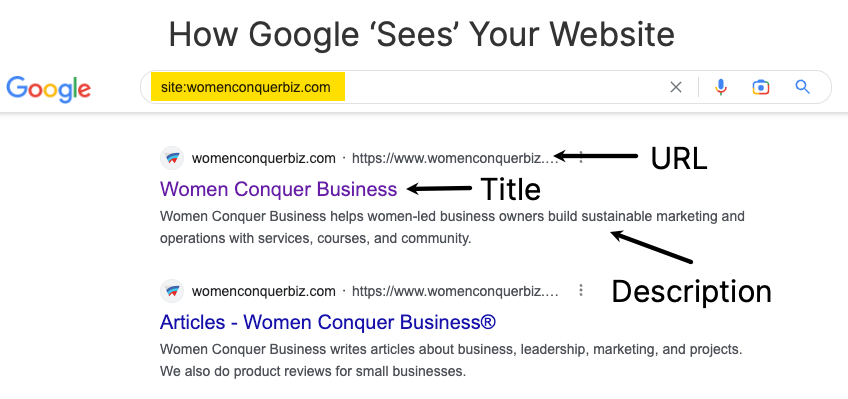Starting a small business is an exciting journey. It also requires careful planning and execution. One of the most critical steps you need to take as a business owner is understanding the importance of SEO for small businesses.
SEO stands for search engine optimization and can help your website get more visibility in organic (unpaid) search results on major engines like Google, Bing, DuckDuckGo, etc.
In this article, we'll cover the following:
- What SEO entails.
- How to implement it into your website or marketing strategy.
- Common mistakes to avoid, and
- Success tips for small businesses.
Let's dive into why the importance of SEO for small businesses cannot be overstated.
Find Keywords for Your Business
Long-tail keywords are great for small businesses because they're easier to rank for, and focused on conversions. I created this AI prompt to help you find keywords based on your topic or service. Give it a try below:
What is SEO?
SEO is optimizing a website or web page to increase its visibility in search engine results. It involves using techniques such as:
- Keyword research (finding (and using) the words your audience is searching for).
- Content optimization (editing and linking blog posts or web pages AKA on-page SEO).
- Link building (getting other websites to link back to your site AKA off-page SEO).
- Technical SEO (is your website well-coded, does it load quickly?).
SEO is a huge discipline that boils down to answering your customer's most important questions on a platform appealing to major search engines.
Do you want more high-quality traffic? SEO is the easiest and cheapest way to do it. Unlike ads, where the response can be instant, SEO takes time before your SEO efforts are fully realized — anywhere from a few weeks to a year before Google 'catches up' with your website updates.
Benefits of SEO
The main benefit of SEO is increased visibility in organic search engine results (unpaid), leading to more targeted visitors coming to your website from those searches.
This helps your business reach its target audience more effectively (and much longer after your initial investment) than traditional marketing methods such as print ads or television commercials.
An optimized website also makes it easier for potential customers to find you online since they don't have to wade through irrelevant listings or guess what words might be associated with your business offerings.

Improve the user experience, so it's effortless for prospects to navigate and the site loads quickly. This can keep people on your website longer, which makes people more likely to convert.
Do you enjoy waiting for a website to load?
Neither do your customers.
SEO is a powerful tool to help your business grow and reach its goals. With the proper research, optimization, and monitoring, you can take your business to the next level.
Now let's look at how to get started with SEO.
How to Get Started with SEO
1. Basic Keyword Research
Before optimizing your website content for SEO, you must research the keywords most relevant to your business.
Consider what words or phrases potential customers might use when searching for products or services like yours. Your internal language or fancy jargon has no place in SEO unless your customers also use those terms (they aren't).
Don't get prevent good SEO because the words sound too simple. You're attracting customers who aren't the expert you are. Resist the urge to sound 'smart' on your website.
Once you have a list of potential keywords, use tools such as Google Trends and Keyword Planner to determine which ones are being searched most often and have the highest search volume. If Google Trends and Keyword Planner are too daunting, try Surfer SEO's free Keyword Surfer Chrome Extension. SEO tools can be invaluable while researching, but the content must sound like you.
2. Optimize Your Website Content
After researching the best keywords for your business, start editing your web content by incorporating those terms into titles, headings, meta descriptions, body copy, and more.
If you're unsure how Google sees your website, type site:yourdomainname.com into Google. This will return the URLs, titles, and descriptions for your website.

Make sure each page has unique title tags and meta descriptions that accurately describe its contents so search engines can easily index them in their results pages.
Additionally, create high-quality informative and engaging content so readers will be encouraged to stay on your site longer.
As you implement SEO tactics on your website, monitor how they perform with analytics tools such as Google Analytics or Moz Pro. These platforms provide valuable insights into how users interact with your site - from bounce rates to average time spent on page - so you can make adjustments if needed.
You should also keep an eye out for any changes in rankings or traffic over time, so you know whether or not specific strategies are working effectively.
Once you have researched the keywords, optimized your website content, and monitored your progress, you are ready to move on to common mistakes to avoid when doing SEO.
Common Mistakes to Avoid When Doing SEO
1. Not Having an SEO Strategy in Place
One of the most common mistakes small business owners make when implementing is not having a plan. Without a plan, it’s impossible to know what keywords you should be targeting or how to optimize your website content for those keywords. It’s also challenging to measure success without any goals set beforehand.
To ensure the successful implementation of an SEO strategy, create a detailed plan that outlines your objectives and desired outcomes before taking any action.
2. Not Understanding the Basics of SEO
Another mistake many small business owners make is not understanding the basics of search engine optimization (SEO). Many people think they can “wing it” when optimizing their website for search engines, but this isn’t usually effective.
Taking time to learn about keyword research, link-building strategies, and other essential components of SEO will help ensure better results from your efforts.
With more than half of all web traffic coming from mobile devices, ignoring mobile optimization and responsive design can have disastrous consequences for businesses trying to implement an effective SEO strategy. Test your website on your phone and tablet. Is it easy to use?
It is essential to be aware of the common mistakes that can occur when implementing SEO, as they can lead to costly errors and lost opportunities. By following the tips in this article, you will be well on your way to successful SEO implementation for small businesses.
Tips for Successful SEO Implementation for Small Businesses
1. Focus on Quality Content Creation and Distribution Strategies
Quality content is vital to SEO success. Creating informative, engaging, and relevant content will help you rank higher in search engine results pages (SERPs).
Additionally, distributing this content through social media channels such as Facebook and Twitter can also help boost your rankings.
2. Use Social Media Platforms To Promote Your Content And Increase Visibility
Social media platforms such as Instagram, LinkedIn, YouTube, and Pinterest can significantly improve your content and increase your brand's online visibility. Posting regularly with quality images or videos on related topics will draw attention from potential customers who may not have found you otherwise.
Once you’ve implemented an effective SEO strategy for small businesses, it is essential to monitor the results closely so that adjustments can be made if something isn’t working correctly or if there are areas where improvement could be made.
Utilizing tools such as Google Analytics can provide valuable insights into what strategies work best for driving traffic and conversions, allowing them to be optimized over time.

FAQs: the Importance of SEO for Small Businesses
Is SEO worth it for small business?
Yes, SEO is worth it for small businesses. It can help them reach more potential customers and increase their visibility online. Search engine optimization (SEO) involves optimizing a website's content to make it easier for search engines like Google to find and rank the website in relevant searches.
This helps increase the site's organic traffic, increasing sales and conversions. SEO also helps improve user experience on the website by ensuring visitors can find what they’re looking for quickly. These factors make SEO essential to any small business’s marketing strategy.
Why is SEO important for small businesses in 2023?
SEO (Search Engine Optimization) is essential for small businesses in 2023. It helps them reach their target audience by optimizing their website and content to rank higher on search engine results pages.
SEO ensures that customers can easily find the business online, increasing visibility and driving more traffic to the website. Additionally, it increases brand awareness and trustworthiness of a business’s products or services. With proper optimization, small businesses can stay ahead of the competition and gain a competitive edge in the market.
How can small entrepreneurs benefit from using SEO?
SEO (Search Engine Optimization) is an essential tool for small entrepreneurs. It helps them increase their online visibility, reach more potential customers, and drive traffic to their website. SEO can help small businesses appear higher in organic search engine rankings, making it easier for customers to find them.
Additionally, SEO helps improve the overall user experience on a website by optimizing content and page structure for better readability and usability. Finally, SEO can also help with brand building and provide valuable insights into customer behavior that can be used to inform marketing strategies.
In short, SEO is an invaluable tool that all small business owners should take advantage of if they want to maximize their success online.
What are the top 10 benefits of SEO?
1. Increased Visibility: SEO helps businesses gain visibility in search engine results, allowing them to reach more potential customers.
2. Cost-Effective: SEO is a cost-effective way to increase website traffic and leads compared to traditional marketing methods like print or television ads.
3. Long-Term Results: SEO can produce long-term results that last for years after the initial investment has been made, making it an attractive option for small business owners who want to get the most out of their budget.
4. Increased Brand Awareness: By appearing higher in search engine rankings, businesses can increase brand awareness and recognition among their target audience and new prospects looking for similar services or products online.
5. Improved User Experience: Optimizing websites with relevant keywords and content improves user experience by providing visitors with the information they are looking for quickly and easily, increasing engagement on the site which can lead to conversions over time.
6. Better Conversion Rates: With improved visibility comes better conversion rates from organic searches due to increased trust from users when they find what they need quickly through a reputable source such as Google or Bing’s search engine results pages (SERPs).
7. Higher Quality Traffic: By targeting specific keywords related to your business’s offerings, you will attract more qualified leads who are already interested in what you have to offer rather than just random visitors who may not be ready yet convert into paying customers right away.
8. Enhanced Credibility & Trustworthiness: A solid presence on SERPs increases the credibility and trustworthiness of your brand since people tend to associate higher-ranking sites with quality services/products.
9 . Competitive Edge: Appearing at the top of SERP rankings gives businesses an edge over competitors, helping them stand out from other companies offering similar services/products.
10 . Measurable Results: SEO provides measurable results that allow marketers to track progress over time, enabling them to make adjustments if needed so campaigns remain effective throughout different stages of growth.
Ready to Get Started?
In conclusion, SEO is an essential tool for small businesses to help them reach their target audience and gain visibility in the digital world. Getting started with SEO can be daunting, but by avoiding common mistakes and following some simple tips, you can create a successful SEO strategy that will benefit your business in the long run.
With dedication and hard work, you can make sure your small business stands out from the competition and reaches its full potential. Remember: The importance of SEO for small businesses cannot be overstated!
Need more support? Attend an upcoming event or join our membership.



